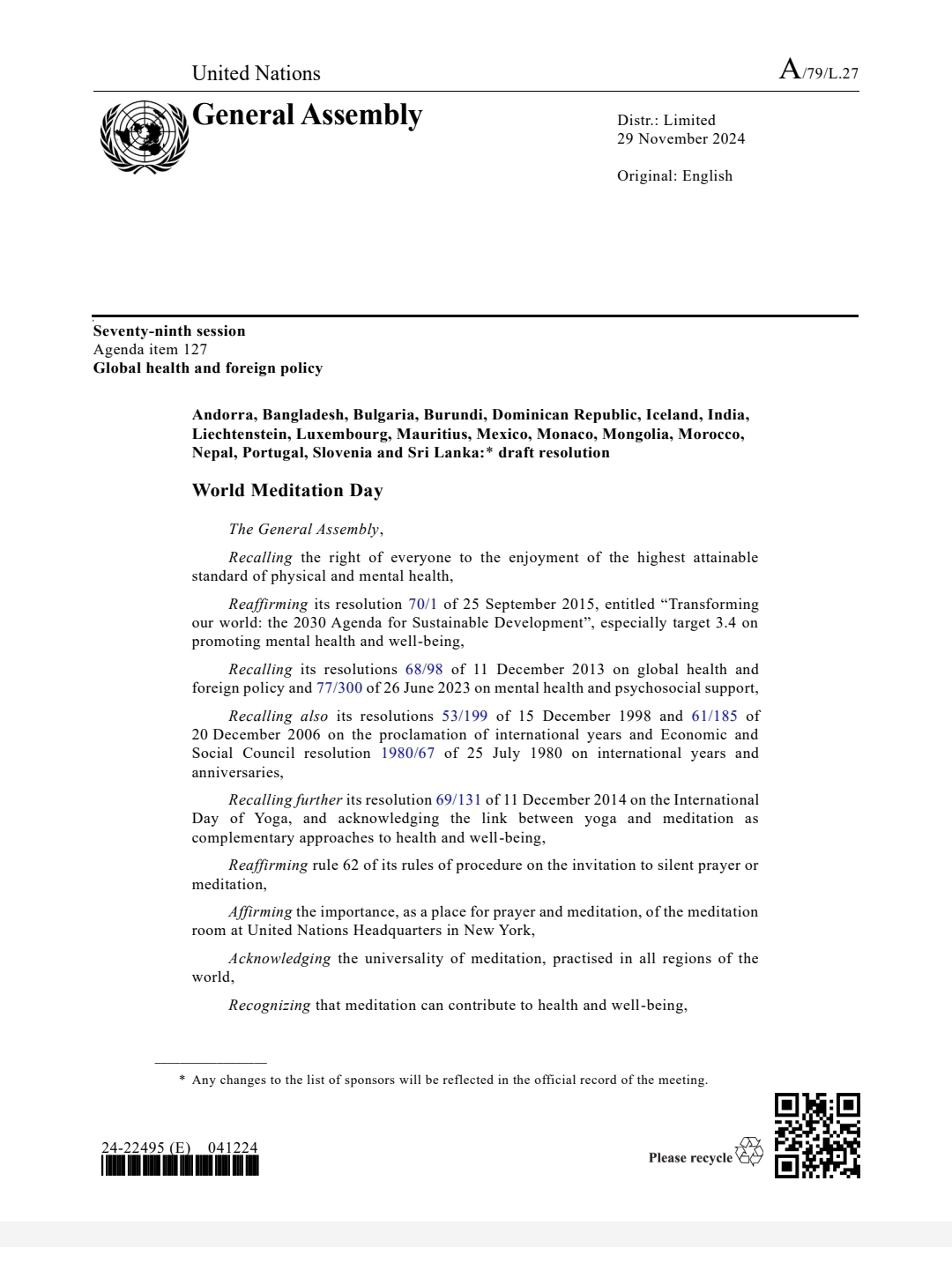World Meditation Day DEC 21
The National UN Volunteers-India
𝗧𝗵𝗲 𝗙𝗶𝗿𝘀𝘁 𝗪𝗼𝗿𝗹𝗱 𝗠𝗲𝗱𝗶𝘁𝗮𝘁𝗶𝗼𝗻 𝗗𝗮𝘆
The UN General Assembly has declared December 21st as World Meditation Day, co-sponsored by India. This date coincides with the winter solstice, a significant day in Indian culture tied to agricultural traditions and astronomical observations. The declaration recognizes meditation's benefits for well-being and aligns with India's emphasis on holistic health.
𝗦𝗶𝗴𝗻𝗶𝗳𝗶𝗰𝗮𝗻𝗰𝗲
This marks the beginning of longer days, symbolizing renewal, prosperity, and hope for Indian farmers preparing for harvest season.
Historically, ancient Indian texts like Surya Siddhanta mention the solstice, and hence it's an important factor in calendrical calculations and also in the alignments of temples. The practices of yoga and meditation, too, get affected because during this period people believe one needs deep introspection and spiritual awakening.
It is thus a reminder of December 21st and the richness of India's astronomical heritage and its very connection to nature, cycles of time, and cultural celebrations honoring the Sun and the life-giving energy from it.
It also falls exactly six months after the International Day of Yoga commemorated on June 21, which is the Summer Solstice.
On this day, the Earth’s axial tilt causes the Sun to appear at its southernmost position in the sky, resulting in the shortest day and longest night of the year in the Northern Hemisphere.
In India, the winter solstice is deeply intertwined with agricultural and cultural traditions. Although not widely celebrated as a standalone event, it is closely related to festivals like Makar Sankranti, which occurs in January and signifies the Sun's transition into Capricorn (Makara).
𝗔𝗶𝗺
To raise awareness about meditation and its benefits, the General Assembly proclaimed 21 December as World Meditation Day, recalling the right of everyone to the enjoyment of the highest attainable standard of physical and mental health.
Additionally, the General Assembly acknowledged the link between yoga and meditation as complementary approaches to health and well-being.
𝗖𝘂𝗹𝘁𝗶𝘃𝗮𝘁𝗶𝗻𝗴 𝗣𝗲𝗮𝗰𝗲 𝗮𝗻𝗱 𝗨𝗻𝗶𝘁𝘆 𝘁𝗵𝗿𝗼𝘂𝗴𝗵 𝗠𝗲𝗱𝗶𝘁𝗮𝘁𝗶𝗼𝗻
At the United Nations, meditation holds a special place, exemplified by the Meditation Room at UN Headquarters in New York. Opened in 1952 under the guidance of Secretary-General Dag Hammarskjöld, this "𝗥𝗼𝗼𝗺 𝗼𝗳 𝗤𝘂𝗶𝗲𝘁" symbolizes the essential role of silence and introspection in achieving global harmony.
As Mr. Hammarskjöld put it, this house, dedicated to work and debate in the service of peace, "should have one room dedicated to silence in the outward sense and stillness in the inner sense."
In times of global challenges, such as armed conflicts, climate crises, and rapid technological advancements, meditation offers a powerful means to cultivate peace, unity, and compassion.
World Meditation Day reminds us of the importance of nurturing human consciousness to address these issues and create harmony within ourselves and our communities. By fostering inner peace through meditation, individuals contribute to building a more resilient and sustainable world for current and future generations.
𝗚𝗼𝗼𝗱 𝗛𝗲𝗮𝗹𝘁𝗵 𝗮𝗻𝗱 𝗪𝗲𝗹𝗹 𝗯𝗲𝗶𝗻𝗴
Meditation is increasingly recognized for its contributions to mental health — a fundamental human right — and its alignment with the Sustainable Development Goals (SDGs).
The 2030 Agenda for Sustainable Development emphasize health and well-being as central to achieving sustainable development. Goal 3, "Good Health and Well-Being," aims to ensure healthy lives and promote well-being for all at all ages, addressing key challenges such as maternal and child health, communicable and non-communicable diseases, and access to essential medicines and vaccines. This target also highlights the importance of mental health, universal health coverage, and the reduction of health inequities to build resilient and inclusive societies.
The Permanent Mission of India to the United Nations in New York is marking the first-ever World Meditation Day at the UN headquarters on December 20. The commemorative event at the UN will feature a keynote address by 𝗚𝘂𝗿𝘂𝗱𝗲𝘃 𝗦𝗿𝗶 𝗦𝗿𝗶 𝗥𝗮𝘃𝗶 𝗦𝗵𝗮𝗻𝗸𝗮𝗿. This momentous occasion, themed ‘Meditation for Global Peace and Harmony,’ would mark the First World Meditation Day.
𝗗𝗶𝗱 𝘆𝗼𝘂 𝗞𝗻𝗼𝘄?
According to archaeologists, meditation dates back to 5,000 BCE, and the practice itself has ties in ancient Egypt and China, Judaism, Hinduism, Jainism, Sikhism and Buddhism.
Estimates suggest that between 200 and 500 million people practice meditation worldwide.
Meditation can help reduce stress, blood pressure and anxiety, promote emotional health, enhance self-awareness and improve sleep.






